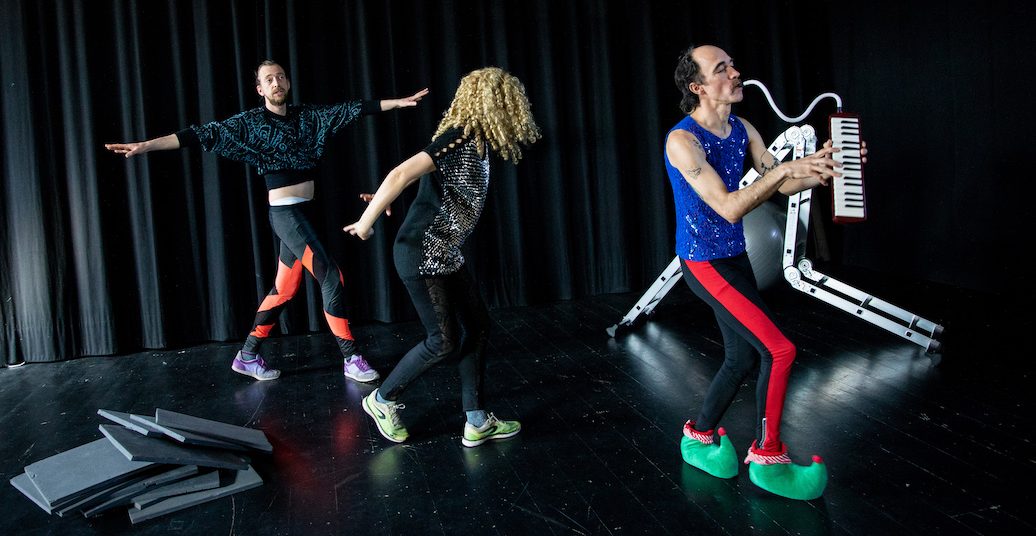Hermann Heisig’s “happy sisyphos” is a playful examination of the ancient Sisyphean myth for a young audience in which the seeming pointlessness of repetition collectively dissolves into thin air.
Does repetition feel threatening, because it seems to leave no room for change? Is it the manifestation of our contradictory existence with its alienated routines – and thus a reason for resignation and depression? Or is there not also something soothing and relieving about repetition, the promise of reliability and stability? The potential offered by repetition, in which the past is simultaneously the future and vice-versa, is not due to a lack of alternatives, but rather to the minimal differences that unintentionally allow repetition – and Hermann Heisig’s piece “happy sisyphos“ appears to already hint at this in the title.
“Do you know the story of Sisyphus?”, Hermann Heisig asks his very young audience. A girl – perhaps 12 years old – immediately raises her hand and pointedly summarizes: the story is about a god who was punished for cheating. And who was damned to roll a boulder up a mountain that always rolled back down right before reaching the summit. That was a pretty good summary of the ancient myth. “Then we can all head back home”, Hermann Heisig commented – but of course he continues, telling the story with a different spin and from a new perspective: rhythmically, chorally, playfully, and with song and always in dialogue with the young audience.
Hermann Heisig’s “happy sisyphos”, which was performed on 21 May 2022 during this year’s Potsdamer Tanztage at fabrik Potsdam and following two Covid-related delays, was conceived for children aged 8 and up. It approaches the Greek myth through rhythm and with the help of a few imaginatively deployed props – a suitcase packed to the brim with costumes, a ladder, a fitness ball, and a pile of cushions that continuously give rise to new spaces and landscapes. With humor and repetitions, the performers (Ayşe Orhon, Hermann Heisig, Thomas Proksch) guide the audience through the story of Sisyphus, his encounter with the god of death, Thanatos, the way he fools him and conquers death – but what would happen then, the audience is asked? The sharp girl reveals herself to be a philosopher: “Then we humans will be superfluous.” Meanwhile, we are guided forward on his journey to the underworld of the dead, his brief return to the world of the living. Finally, we witness his laborious, unsuccessful attempts to heave the boulder up the mountain. Perhaps too unfamiliar with details of the myth and its perceptions, or perhaps too far removed from my own childhood, I lose sight of the big picture, confused by the slightly frenzied stage activity, which, on the other hand, seems to resonate in the spellbound and concentrated faces of the children. It is lovely to observe how attentive even the very young children in the audience are to the nuances and details of the scene, how spontaneously and openly they respond to audience participation offers, so that even small, seemingly failed moments blend as though intentionally into the production.
Nevertheless, I ask myself: What does “suitable for children 8 and up” suggest? Should it also appeal to me, the older, more experienced viewer over 30? But then why am I almost the only adult audience member here not accompanying a child? Is it indeed more of a piece for children and less also for children?
“happy sisyphos“ is a production from explore dance – Network Dance for Young Audience, a nationwide network funded by TANZPAKT Stadt-Land-Bund, which has been funding sustainable structures for the production of contemporary dance pieces for young audiences since 2018. Pieces developed within this framework are created in close dialogue with children and young adults. Workshops in schools and, on the other hand, rehearsal visits by school students are an integral part of the artistic production process, with the goal of facilitating an “exchange at eye level”, according to Jeanne Chapy, a member of the project team. Is that why the young girl is so familiar with the myth? And, vice-versa, does the manner in which a piece is staged benefit from such communicative interconnection with the audience?
With the words, repetition is also something positive, we are invited to take part in a final group ritual. We leave the stage area and head outdoors, where we collectively form a huge imaginary boulder, which we then lift together, making it very light – until it finally dissolves into thin air. Sisyphus could be a happy man if he would join forces with others instead of being a lone warrior out to trick them.
English translation by Melissa Maldonado
„happy sisyphos“ (8+) by Hermann Heisig (Performance: Ayşe Orhon, Hermann Heisig, Thomas Proksch; Duration: 30 minutes) premiered on 21 May 2022, in the frame of Potsdamer Tanztage festival, at the Studiohaus of fabrik Potsdam.




